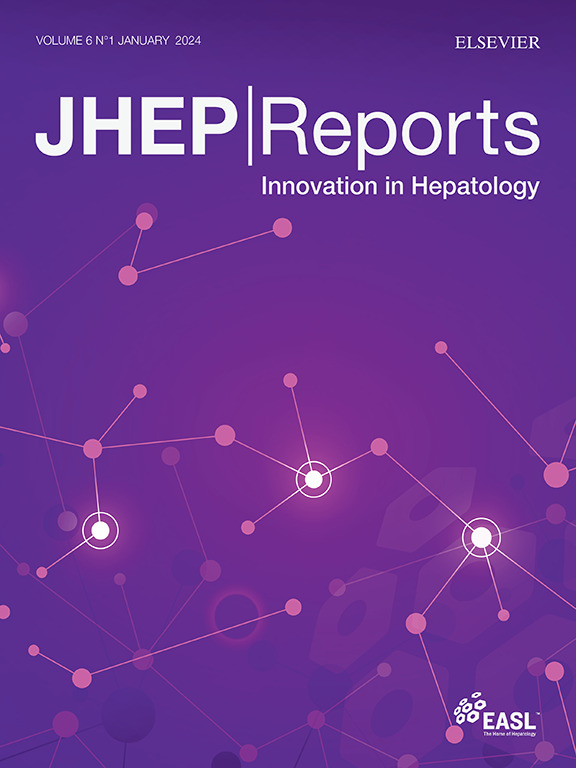Impact of age on clinical outcomes among patients with hepatocellular carcinoma: A systematic review and meta-analysis
IF 9.5
1区 医学
Q1 GASTROENTEROLOGY & HEPATOLOGY
引用次数: 0
Abstract
Background & Aims
Older adults have lower treatment eligibility and worse survival across cancer types; however, the association between age and outcomes in patients with hepatocellular carcinoma (HCC) has not been well characterized.
Methods
We performed a search of the PubMed, Ovid MEDLINE, and EMBASE databases from January 2000 to July 2022 to identify studies reporting tumor stage, curative treatment, and overall survival among patients with HCC, stratified by age. Using the DerSimonian and Laird method for a random-effects model, we calculated pooled risk ratios (RRs) for curative treatment receipt and hazard ratios (HRs) for overall survival among younger and older patients (per age thresholds in each study).
Results
We identified 103 studies (n = 154,152 patients) that reported outcomes in younger vs. older patients with HCC. Younger patients were more likely to undergo curative treatment (RR 1.48, 95% CI 1.24–1.77; I2 = 99%), although few studies reported treatment among those with early-stage HCC. Younger patients had better survival than older patients (HR 0.87, 95% CI 0.83–0.92; I2 = 89%), which was consistent in subgroups using age thresholds of <70 years (HR 0.94, 95% CI 0.89–0.99; I2 = 78%) and <75 years (HR 0.83, 95% CI 0.70–0.98; I2 = 79%). Younger patients also had better survival in studies of patients with early-stage HCC (HR 0.78, 95% CI 0.65–0.94; I2 = 60%) and those undergoing curative therapy (HR 0.87, 95% CI 0.77–0.98; I2 = 87%).
Conclusions
Older patients with HCC are less likely to receive curative treatment and have worse survival than their younger counterparts. Studies to identify factors associated with worse prognosis can inform intervention targets.
Impact and implications
Older adults have worse survival across cancer types, although there are discordant data about the association between age and clinical outcomes in patients with hepatocellular carcinoma (HCC). Lower curative treatment receipt among older patients, despite similar early-stage presentation compared with younger patients, requires future studies to identify mediators that can inform intervention strategies that can increase curative treatment use. Worse survival observed among older patients appears to be primarily driven by non-liver-related mortality; however, few studies distinguish between liver and non-liver mortality. A better understanding of the prognostic value of comorbidity burden, in addition to age, can inform clinical decisions about stopping rules for HCC surveillance as well as the potential for HCC overdiagnosis and overtreatment.
年龄对肝细胞癌患者临床结局的影响:一项系统回顾和荟萃分析
背景,在所有癌症类型中,AimsOlder成人的治疗资格较低,生存率较差;然而,肝细胞癌(HCC)患者的年龄与预后之间的关系尚未得到很好的表征。方法检索2000年1月至2022年7月期间的PubMed、Ovid MEDLINE和EMBASE数据库,以确定按年龄分层的HCC患者的肿瘤分期、治愈治疗和总生存期的研究。使用随机效应模型的DerSimonian和Laird方法,我们计算了年轻和老年患者接受根治性治疗的合并风险比(rr)和总生存率的风险比(hr)(每个研究中的每个年龄阈值)。我们确定了103项研究(n = 154,152例患者),报告了年轻和老年HCC患者的预后。年轻患者更有可能接受根治性治疗(RR 1.48, 95% CI 1.24-1.77;I2 = 99%),尽管很少有研究报道早期HCC患者的治疗。年轻患者的生存率优于老年患者(HR 0.87, 95% CI 0.83-0.92;I2 = 89%),这在年龄阈值为70岁的亚组中是一致的(HR 0.94, 95% CI 0.89-0.99;I2 = 78%)和<;75岁(HR 0.83, 95% CI 0.70-0.98;I2 = 79%)。在早期HCC患者的研究中,年轻患者也有更好的生存率(HR 0.78, 95% CI 0.65-0.94;I2 = 60%)和接受根治性治疗的患者(HR 0.87, 95% CI 0.77-0.98;I2 = 87%)。结论老年HCC患者接受根治性治疗的可能性较低,生存期较年轻肝癌患者差。研究确定与预后不良相关的因素可以为干预目标提供信息。影响和启示尽管关于肝细胞癌(HCC)患者的年龄和临床结果之间的关系的数据不一致,但所有癌症类型的成年患者的生存率都较差。尽管早期表现与年轻患者相似,但老年患者的治愈率较低,这需要未来的研究来确定可以告知干预策略的介质,从而增加治愈性治疗的使用。在老年患者中观察到的较差的生存率似乎主要是由非肝脏相关的死亡率驱动的;然而,很少有研究区分肝脏和非肝脏死亡率。除年龄外,更好地了解合并症负担的预后价值,可以为HCC监测停止规则的临床决策以及HCC过度诊断和过度治疗的可能性提供信息。
本文章由计算机程序翻译,如有差异,请以英文原文为准。
求助全文
约1分钟内获得全文
求助全文
来源期刊

JHEP Reports
GASTROENTEROLOGY & HEPATOLOGY-
CiteScore
12.40
自引率
2.40%
发文量
161
审稿时长
36 days
期刊介绍:
JHEP Reports is an open access journal that is affiliated with the European Association for the Study of the Liver (EASL). It serves as a companion journal to the highly respected Journal of Hepatology.
The primary objective of JHEP Reports is to publish original papers and reviews that contribute to the advancement of knowledge in the field of liver diseases. The journal covers a wide range of topics, including basic, translational, and clinical research. It also focuses on global issues in hepatology, with particular emphasis on areas such as clinical trials, novel diagnostics, precision medicine and therapeutics, cancer research, cellular and molecular studies, artificial intelligence, microbiome research, epidemiology, and cutting-edge technologies.
In summary, JHEP Reports is dedicated to promoting scientific discoveries and innovations in liver diseases through the publication of high-quality research papers and reviews covering various aspects of hepatology.
 求助内容:
求助内容: 应助结果提醒方式:
应助结果提醒方式:


